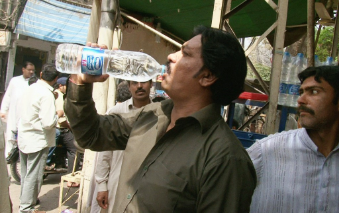Nestle CEO Peter Brabeck-Letmathe
The Story-The Truth About nestles
While the world's population continues to grow at an alarming rate, water is becoming an increasingly scarce commodity. The Swiss film "Bottled Life" documents the booming business with bottled water, by focusing on the global leader in this lucrative multi-billion dollar market – namely, the Nestlé corporation in Switzerland. Nestlé currently controls more than 70 of the world's bottled water brands, among them Perrier, San Pellegrino and Vittel.
Nestlé's annual sales of bottled water alone total some CHF 10 billion. And yet the company prefers not to discuss its water business – as Swiss journalist Res Gehriger discovered when researching this documentary film. The Nestlé management refused to give any interviews or assistance or to provide information. But Gehriger persisted, and discovered just how controversial and conflict-laden the company's international operations are.
Res Gehriger Writer
Water war in the USA
To be able to sell and make money from water, you first have to own it. In the case of Nestlé this applies to many parts of the United States, by far the biggest market for its booming bottled water business. Whoever owns land or has acquired leasing rights is permitted to pump as much water as he likes. In the rural state of Maine, Nestlé has purchased many such water rights and resources. Every year the company pumps out millions of cubic metres of water, for transportation in road tankers to huge bottling factories. In the small towns of Fryeburg, Newfield and Shapleigh, journalist Res Gehriger witnessed how Nestlé tries to stifle and suppress local opposition to its operations with an army of powerful PR consultants, lawyers and lobbyists.
Nestlé's expansion strategy
"Bottled Life" focuses a critical spotlight on Nestlé's global expansion strategy in the business of bottled water. In the United States and Europe, the company sells mainly spring water with a designation of origin. In developing countries, however, the corporation pursues another concept – namely Nestlé Pure Life. This product is purified groundwater, enriched with a Nestlé mixture of minerals. Nestlé Pure Life was the brainchild of Peter Brabeck, a Nestlé man almost all his life, a former CEO and currently Chairman of the Board. Today Nestlé Pure Life is the world's top-selling brand of bottled water.
Test market Pakistan
Res Gehriger's research took him to Pakistan, Nestlé's test market for its Pure Life product. The company refused him access to its production plant in Pakistan – but Gehriger did get to see something of life outside the factory fence. In the nearby village groundwater levels have fallen dramatically, and the village fountain water is nothing more than foul-smelling sludge.
Nestlé Pure Life is a clever business concept. And particularly so in the developing world. In countries such as Pakistan where the public water supply has failed or is close to collapse, the company proudly presents its bottled water as a safe health-enhancing alternative. But for the overwhelming majority of consumers, it is an expensive out-of-reach alternative. In Lagos, for example, the mega metropolis of Nigeria/Africa with its population of millions, water always comes at a price. The scenario of a city in which everyone has to pay for life-giving water, is already a sad reality in Lagos. Families eking out an existence in the slums spend half their meagre budget on canisters of water. The upper class? They purchase Nestlé Pure Life.
Bottled Life documentary directed by Urs Schnell 2012. Writern by Res Gehringer
Whitewashing the water business
Nestlé places great priority on promoting its image. And when it comes to water, it's Peter Brabeck in particular who does the promoting. As CEO – and even more so after becoming Chairman of the Board in 2005 – he developed a communications strategy which operates under such noble pretences as "Corporate Social Responsibility" and "Creating Shared Value." A preached philosophy – but a practised one?
In researching this film, journalist Res Gehriger comes to a sad and sobering conclusion. It is that of a company intent on amassing resource rights worldwide. With the aim of dominating the global water market of the future.
Nestle CEO Peter Brabeck-Letmathe Water is a human right Company video
Nestle CEO Peter Brabeck-Letmathe Water is Not A Human Right - English Subtitles












